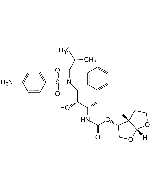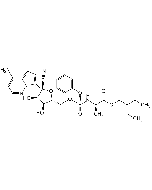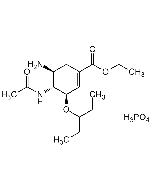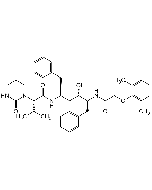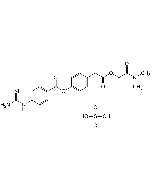Cookie Policy: This site uses cookies to improve your experience. You can find out more about our use of cookies in our Privacy Policy. By continuing to browse this site you agree to our use of cookies.
AdipoGen Life Sciences
Darunavir . ethanolate
As low as
60
CHF
CHF 60.00
In stock
Only %1 left
AG-CR1-3724-M01010 mgCHF 60.00
AG-CR1-3724-M05050 mgCHF 150.00
AG-CR1-3724-M250250 mgCHF 350.00
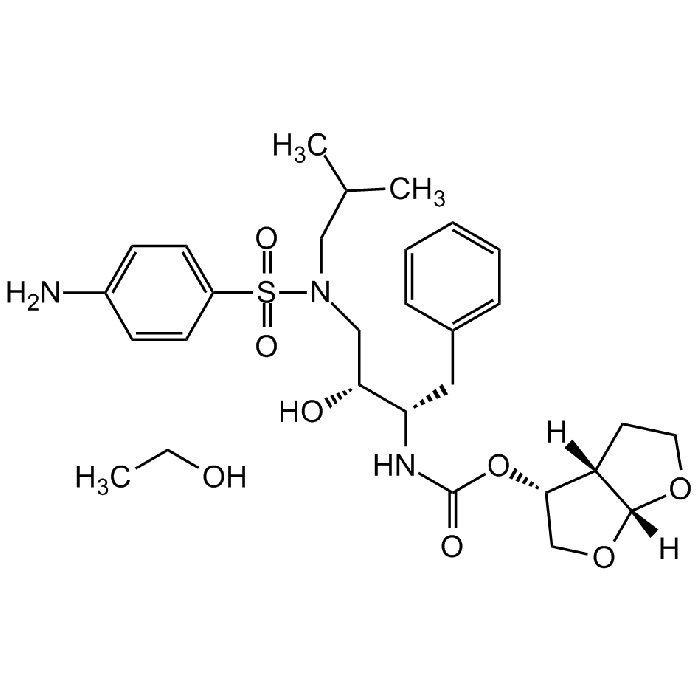
| Product Details | |
|---|---|
| Synonyms | TMC114; TMC41629; UIC-94017; HSDB 7788; Prezista |
| Product Type | Chemical |
| Properties | |
| Formula |
C27H37N3O7S . C2H5OH |
| MW | 547.7 . 46.0 |
| CAS | 635728-49-3 |
| Purity Chemicals | ≥98% (HPLC) |
| Appearance | White to off-white solid. |
| Solubility | Soluble in DMSO (30mg/ml). Very slightly soluble in water (~0.15mg/ml). |
| Identity | Determined by 1H-NMR. |
| InChi Key | QWSHKNICRJHQCY-VBTXLZOXSA-N |
| Smiles | NC1=CC=C(S(=O)(N(C[C@@H](O)[C@H](CC2=CC=CC=C2)NC(O[C@H]3CO[C@]4([H])[C@@]3([H])CCO4)=O)CC(C)C)=O)C=C1.CCO |
| Shipping and Handling | |
| Shipping | AMBIENT |
| Short Term Storage | +4°C |
| Long Term Storage | -20°C |
| Handling Advice | Keep cool and dry. |
| Use/Stability | Stable for at least 2 years after receipt when stored at -20°C. |
| Documents | |
| MSDS |
 Download PDF Download PDF |
| Product Specification Sheet | |
| Datasheet |
 Download PDF Download PDF |
Description
- Darunavir ethanolate is a highly potent HIV protease inhibitor (IC50=3-6nM, depending on laboratory HIV-1 strain), an antiretroviral medication used to treat and prevent HIV/AIDS. The ethanolate formulation has some stability advantages compared to the free base Darunavir (Prod. No. AG-CR1-3712).
- Darunavir ethanolate is a second generation HIV-1 protease inhibitor that inhibits replication of various laboratory strains and clinical isolates of HIV-1, including those resistant to first generation protease inhibitors. It inhibits cell-free diffusion and cell-to-cell spread of HIV-1 in Jurkat cell populations.
- Formulations containing darunavir have been used in combination therapy for the treatment of HIV.
- Shown in a SARS-CoV-2 protease structure model study to potentially bind and inhibit the papain like viral protease (PLVP) of SARS-CoV-2, responsible for COVID-19.
Product References
- Potent HIV protease inhibitors incorporating high-affinity P2-ligands and (R)-(hydroxyethylamino)sulfonamide isostere: A.K. Ghosh, et al.; Bioorg. Med. Chem. Lett. 8, 687 (1998)
- Novel bis-tetrahydrofuranylurethane-containing nonpeptidic protease inhibitor (PI) UIC-94017 (TMC114) with potent activity against multi-PI-resistant human immunodeficiency virus in vitro: Y. Koh, et al.; Antimicrob. Agents Chemother. 47, 3123 (2003)
- Darunavir: a second-generation protease inhibitor: K.H. Busse & S.R. Penzak; Am. J. Health Syst. Pharm. 64, 1593 (2007) (Review)
- Darunavir (TMC114): a new HIV-1 protease inhibitor: J.M. Molina & A. Hill; Expert. Opin. Pharmacother. 8, 1951 (2007) (Review)
- Darunavir: a nonpeptidic antiretroviral protease inhibitor: C. McCoy; Clin. Ther. 29, 1559 (2007) (Review)
- Protease inhibitors effectively block cell-to-cell spread of HIV-1 between T cells: B.K. Titanji, et al.; Retrovirology 10, 161 (2013)
- Polymorphic stability of darunavir and its formulation : J. Chaves, et al.; J. Therm. Anal. Calorim. 123, 2185 (2016)
- Molecular Modeling Evaluation of the Binding Effect of Ritonavir, Lopinavir and Darunavir to Severe Acute Respiratory Syndrome Coronavirus 2 Proteases: S. Lin, et al.; (Epub ahead of print) (2020)






